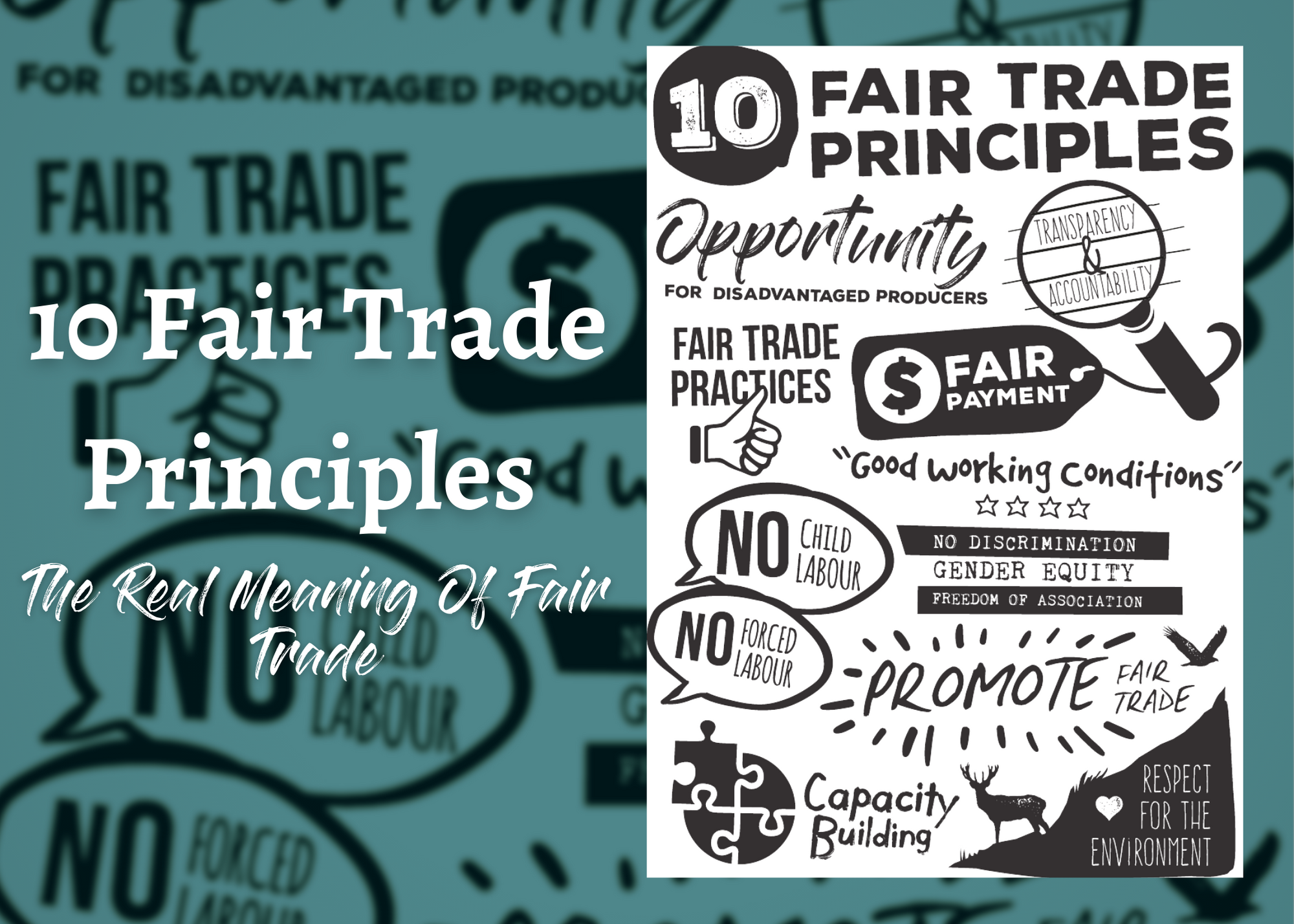10 Principles of Fair Trade - The Real Meaning of Fair Trade

What Are The 10 Principles of Fair Trade?
The 10 Principles of Fair Trade are the fundamental principles and core values of Fair Trade, prescribed and monitored by the World Fair Trade Organization (WFTO).
Todays way of trade (producing and selling goods) has a key focus on providing and benefiting the consumer which in most cases, has a negetive impact on social, economic and environmental factors.
These principles of Fair Trade help us understand the most ethical and sustainable way to both produce and sell goods in todays global economy, uplifting the most disadvantaged producers.
We hope this blog post will put WFTO's 10 Fair Trade Principles simply and easy to understand for you. If you would like to see WFTO's (official version) of the 10 Principles of Fair Trade, then you can find that here.
Nonetheless, lets look deeper into the 10 Principles and the real meaning of the term "Fair Trade".
1. Creating Opportunities for Economically Disadvantaged Producers
Todays way of trade is solely focused on the consumer. In doing so, this disregards the efforts of the people that make the product, often leading to increases in poverty and marginalised people. Ideally, we want to benefit both the producer and the consumer, however this is not the outcome we get with the traditional supply and demand system. Becuase of this lack of concern and care for the "people behind the product", Fair Trade embraces those who are disadvantaged by creating more opportunities, making it a "win win" for both consumer and producer.
Fair Trade's aim is to educate and train marginalised small producers. With this constant nurturing in place, producers become more capable at doing their job, and it often results in a better and higher quality final product.
One example of creating opportunities for ecomonically disadvantaged producers is working with Artisans with a disability who have been marginalised and connecting directly with Artisans to encourage and create new opportunities for them through the input into design, creating a market for their products.
Fair Trade allows producers to become more than just "producers" and rather highly skilled Artisans.

2. Transparency and Accountability
There are no closed doors when practising Fair Trade. Communiction channels are open at all levels of the supply chain.
Todays businesses often get too caught up keeping their supply chain disclosure to a minimum hiding or twisting the truth of unethical parts of their business.Some don't even understand their supply chain. This is a huge concern for both the people who work within the organisation and the consumer.
Fair Trade is much more concerned with the truth and integrity of the processes that happens behind the scenes.
Fair Trade is also more focused on providing ways of getting employees, members and producers more involved and having more input in the decision making process.

3. Fair Trading Practices
Fair Trade is concerned for the social, economic and environmental well-being of producers.
This principle is mainly concerned with fulfilling business duties and "doing business" ethically (e.g. paying invoices, avoiding unfair competition with other Fair Trade organisations, effective communication with Fair Trade partners, not plagarising designs). In doing this, Fair Trade recognises, promotes and protects the cultural identity and skills of the procducers, so no one is left behind.

4. Fair Payment
"Equal pay for equal work by women and men" is the main approach to the Fair Payment Fair Trade principle. This principle is broken up into 3 sub principles: Fair Prices, Fair Wages and Local Living Wages.
Fair Prices
A Fair Price is freely negotiated through dialogue between the buyer and the seller and is based on transparent price setting. It includes a fair wage and a fair profit. Fair prices represent an equitable share of the final price to each member/party in the supply chain.
Fair Wages
A Fair Wage is an equitable, freely negotiated and mutually agreed wage, and presumes the payment of at least a Local Living Wage.
Local Living Wage
A Local Living Wage is remuneration received for a standard working week by a Worker in a particular place, sufficient to afford a decent standard of living for the Worker and her or his family. Some examples of a decent standard of living include food, water, housing, education, health care, transport, clothing, and other essential needs, including provision for unexpected events.

5. Ensuring No Child Labour and Forced Labour
Human trafficking and slavery helps businesses earn and sustain higher profits and helps keep up with supply and demand, but is against human rights, and still exists today and contributes to child labour and forced labour.
With this in mind, Fair Trade organisations must abide by the UN Convention on the Rights of the Child, and the appropriate legislation on the employment of children in their country and state. Child and forced labour should not be involved at all during the supply chain.
Here is something to think about - in developing countries, if adults are paid fairly, there is no need for their children to work.
Fair Trade respects that human rights are more important than unfair ways of making higher profits. Fair Trade organisations aim to operate in a way that supports both the economy and the people.

6. Commitment to Non Discrimination, Gender Equity and Women’s Economic Empowerment and Freedom of Association
This principle ensures the workplace within a Fair Trade organisation are free from discrimination at all means. Some examples include the hiring, training, promotion and termination processes.
Gender equality should be promoted in the workplace, so that women and men are entitled to everything equally. Equal pay for equal work must be adhered to.
Infact, Fair Trade activity empowers women in the community and the most marginalised people of society.
Fair Trade organisations also must respect the right of all employees to form and join trade unions of their choice.
No one deserves to be discriminated which is why this principle is vital to Fair Trade.

7. Ensuring Good Working Conditions
Good working conditons must be created and be sustained within a Fair Trade organisation.
Because of todays constant supply and demand economy, businesses loses tend to neglect a safe working environement for their employees.
This Fair Trade principle ensures that the organsiation complies, at minimum, with the approriate laws and legislation and ILO Conventions.
Fair Trade values people's safety by providing things like masks, adequate ventilation, azo free dyes etc.

8. Providing Capacity Building
Fair Trade organisations help increase developmental impacts for small, marginalised produced through Fair Trade.
Fair Trade organisations work directly with small producer groups with management skills, production capabilities and marketing.
The positive outcome of this, is that producers and members of Fair Trade organisations are able to become highly equipped with the right skills so they can strive to fulfil their role and constantly improve the quality of what they deliever to consumers.
Capcity building goes beyond just income generation and empowers personal and life skills such as budgeting, parenting skills, saving and banking.
Building the capacity of those involved with Fair Trade, boosts consumer/customer satisfaction, resulting into more people willing to promote Fair Trade and return buyers.
9. Promoting Fair Trade
It's important to promote Fair Trade to raise awareness. The more people onbaord and supporting Fair Trade, the greater impact Fair Trade organsations can have on supporting small producer groups and abolishing salvery/poverty and increasing awareness for positive environmental imapact.
It's also important that Fair Trade is promoted to consumers. This helps consumers meet all their consumer needs in an ethical and sustainable way. The more consumers that buy Fair Trade products, and promote Fair Trade, the greater postive impact Fair Trade will have on society.

10. Respect for the Environment
Fair Trade focuses on encouraging a better life for producer groups, as well as the environment. The demand for mass production causes negetive environmental problems, one being pollution.
Fair Trade has an aim to source their supplies sustainably, buying locally when possible and using production technologies that seek to reduce energy consumption. Fair Trade organisations aim to use recycled or easily biodegradable where possible.
At Uplift Fair Trade, we help support Fair Trade by selling Fair Trade goods, making Fair trade shopping around Australia, accessable and easily done and educating people about Fair Trade. You can find our shop here!

If you would like to download Uplift Fair Trade's design of the 10 Fair Trade Princples click here.
This would be a great idea if you would like to print it out and promote it to the whole world.
Leave a comment
Comments will be approved before showing up.
Also in Fair Trade Stories & Case Studies

Not an ethical shopping guide
Is the Baptist World Aid Ethical Fashion Guide an ethical shopping Guide?
No but it's an amazing report that will help you to take action to speak up about exploitation in the fashion industry.
In this Blog we give advise on to what is a good guide to help you shop ethically.

The Wounds You Can’t See: Emotional Abuse, Manipulation, and the Courage to Speak Out
At Uplift Fair Trade, we believe in true empowerment—helping women and marginalised communities reclaim dignity through fair, meaningful work. Many of our artisans have experienced domestic abuse, and Fair Trade offers them not just income, but healing and hope. In this personal blog, our founder Anna shares her own story of surviving emotional abuse and reflects on how we as a society can better support victims with compassion and respect.




Chad Sultana
Author